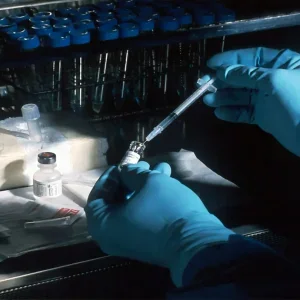Bristol Myers Squibb (BMS) has secured the US Food and Drug Administration (FDA) approval for Breyanzi (lisocabtagene maraleucel) to treat large B-cell lymphoma (LBCL) in adults.
The drug was indicated for LBCL, including diffuse large B-cell lymphoma (DLBCL), high-grade B-cell lymphoma, primary mediastinal large B-cell lymphoma, and follicular lymphoma grade 3B.
Breyanzi is a CD19-directed chimeric antigen receptor (CAR) T cell therapy administered as a defined composition to reduce the variability of the CD8 and CD4 component dose.
It is made from a patient’s own T cells, collected and genetically reengineered to be administered in the inpatient or outpatient setting at a certified treatment centre.
The drug was previously approved in the US for treating adult patients with relapsed or refractory LBCL after two or more lines of systemic therapy.
The current FDA approval expands its indication to include people with refractory or relapsed disease after first-line chemoimmunotherapy and who are not eligible for hematopoietic stem cell transplant (HSCT) due to comorbidities or age.
Breyanzi was previously approved in Europe, Switzerland, Canada and Japan for relapsed and refractory LBCL after two or more lines of systemic therapy.
It comes with a boxed warning about cytokine release syndrome (CRS) and neurologic toxicities and is not indicated for patients with primary central nervous system lymphoma.
Bristol Myers Squibb US Hematology senior vice president and general manager Ester Banque said: “As part of our commitment to developing innovative cancer treatments for patients with critical unmet needs, Breyanzi offers a potentially curative option for more patients.
“Based on the demonstrated clinical benefit, this approval of Breyanzi underscores the significant advances we are making to deliver on the promise of cell therapy.”
The expanded US FDA approval of Breyanzi is based on results from the Phase 3 TRANSFORM study and Phase 2 PILOT study.
In the two clinical trials, the drug has shown a well-established safety profile, with generally low-grade CRS and neurologic events that mostly resolved quickly.
In a separate development, a US District court has declined to dismiss a $6.4bn lawsuit against BMS, in relation to its cancer drug Breyanzi.
According to Reuters’ report, the lawsuit alleged that BMS has delayed its cancer drug Breyanzi to avoid payments to former shareholders of Celgene.
In 2019, BMS has acquired Celgene, the pharmaceutical company that makes cancer and immunology drugs for a consideration of $80.3bn.
The lawsuit was based on the company’s deal to pay contingent value rights to Celgene shareholders if it wins US approval for Breyanzi and two other Celgene drugs.
BMS claimed that it was never properly notified about its alleged default on its merger obligations by UMB Bank, the trustee representing the former Celgene shareholders.
Also, the company argued that the lawsuit must be dismissed because its agreement to pay the Celgene shareholders had expired.
However, the judge said that BMS can be sued, and is not excused from material breaches that preceded the expiration of the agreement.






